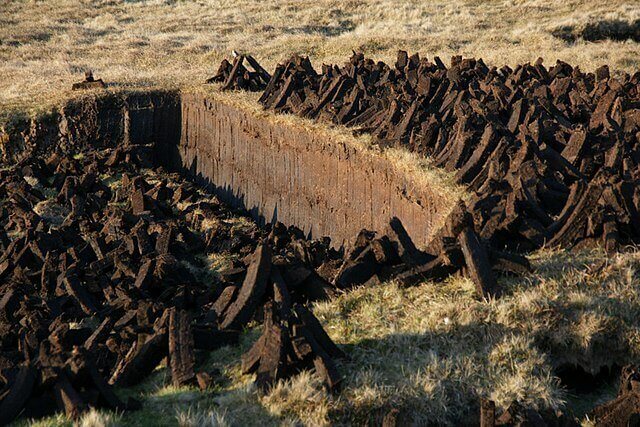
Somerset Levels: bringing an end to thousands of years of peat extraction.
Environmentalists have welcomed the news that businesses might be paid to stop peat extraction.
The government and Somerset County Council are debating how to finance the move.
Peat will no longer be sold to amateur gardeners in England beginning next year, but it can still be mined with a license.
“Peat is an invaluable resource,” according to Somerset Wildlife Trust’s Sian Russell, and its extraction needs to “end as soon as possible”
Peat excavation has been taking place in the Somerset Levels for 2,000 years, but the Liberal Democrats pledged to stop it before winning the county council election last year.
Companies that pledge to end the practice will be compensated by the council.
According to the wildlife trust, the Somerset Levels contain nearly 11 million tonnes of carbon in 60,000 hectares (231 square miles) of peat land. As the largest remaining wetland in the country, it is also a haven for wildlife.
During photosynthesis, the soggy plants in peat absorb carbon dioxide, but because they remain wet rather than fully decompose, they retain that CO2. Carbon that has been stored is released when the peat is dug up.
Mrs Russell said: “Peat extraction will always be a part of Somerset’s history and has shaped the landscape around us today but undisturbed peat is an invaluable resource when it comes to both carbon storage and nature.
“Peat extraction that continues to take place is under licences which were issued decades ago.”
“Every bucket of peat that’s taken from the ground worsens the climate emergency as well as accelerating nature’s decline, so ultimately we need peat extraction to end as soon as possible.”
Godwins, which produces three million bags of compost annually, is located a mile from the wildlife trust’s Westhay National Nature Reserve, which is a patchwork of bird hides and walkways that cross former peat works.
They are still removing small amounts of peat from the levels, but they are investing in new equipment, planning for the future, and providing compost that does not contain peat.
The company’s sixth-generation managing director, Ben Malin, stated that they would eventually cease peat extraction.
“Peat has traditionally been very, very important but we’ve worked really hard over the last 20-odd years to reduce the amount of peat we use,” he said.
“We’re now down to about 30% peat so it’s less important than it was – so we’re preparing for a peat-free future, in line with government legislation.”
“We intend to be here in the long term as a business,” added Mr Malin.
Professional growers will initially be exempt from the DEFRA ban, but a ban is planned for that industry as well. The ban applies to peat in products designed for everyday gardeners.
In Hestercombe Gardens, close to Taunton, food scraps from the kitchen and office are mixed with garden waste to create their own compost, paving the way for a future without peat.
Head gardener Claire Greensdale said: “The only place we struggle really is the bedding plants on the Victorian terrace. They’re grown for us by professionals who are reluctant to change and will probably end their careers as peat phases out.”
She says plants can grow as well without peat being used.
“We used to grow stuff at home without peat, it’s not been that long we’ve used peat at home, so definitely you can grow whatever you want in a good soil,” she said.
Peat lands, according to a Defra spokesperson, are not only the largest carbon stores in the UK but also an “iconic” part of the country’s landscape.
“They also supply over a quarter of the UK’s drinking water, decrease flood risk and provide food and shelter for rare wildlife,” they said.
“However, when peat is extracted or becomes degraded it can release carbon dioxide contributing to climate change.”
According to the spokesperson, the government no longer issues permits for peat extraction on new or existing sites.
“We are continuing to explore how best we can support Mineral Planning Authorities, such as Somerset County Council, when opportunities to voluntarily bring an end to extraction are identified,” they said.
Somerset County Council, according to a spokesperson, is “keen” to collaborate with operators who wish to cease peat extraction on their own initiative.
“We don’t have figures for extraction rates or amounts removed in recent years but the number of operational sites is certainly reducing,” the spokesperson added.
“All licenses are due to expire by the end of 2042, however it is anticipated most, if not all, will be complete in advance of this.”
——————————————————————————
At Natural World Fund, we are passionate about stopping the decline in our wildlife.
The declines in our wildlife is shocking and frightening. Without much more support, many of the animals we know and love will continue in their declines towards extinction.
When you help to restore a patch of degraded land through rewilding to forests, meadows, or wetlands, you have a massive impact on the biodiversity at a local level. You give animals a home and food that they otherwise would not have had, and it has a positive snowball effect for the food chain.
We are convinced that this is much better for the UK than growing lots of fast-growing coniferous trees, solely to remove carbon, that don’t actually help our animals to thrive.
This is why we stand for restoring nature in the UK through responsible rewilding. For us, it is the right thing to do. Let’s do what’s right for nature!
Support our work today at https://naturalworldfund.com/ and join in the solution!

